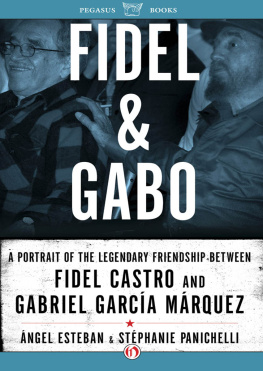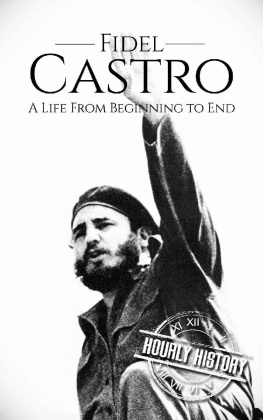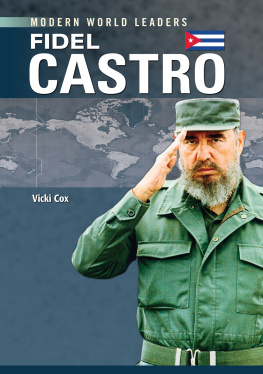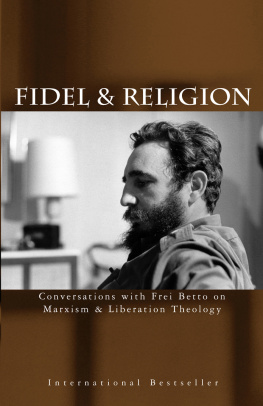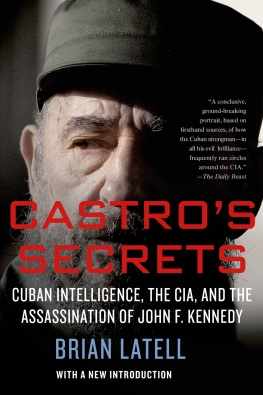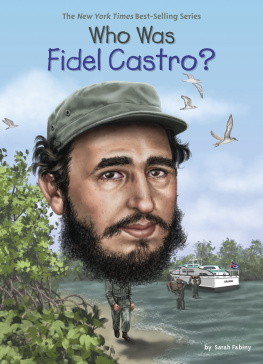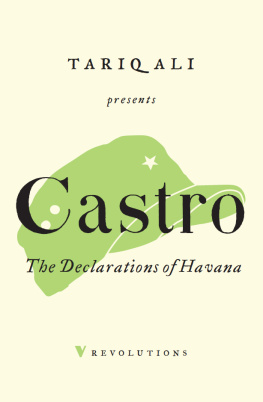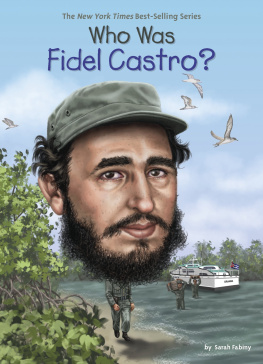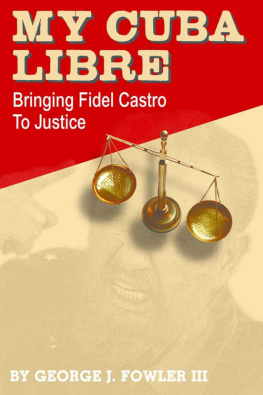FIDEL
AND
GABO
FIDEL
AND
GABO
A PORTRAIT OF THE LEGENDARY FRIENDSHIP BETWEEN
FIDEL CASTRO AND
GABRIEL GARCA MRQUEZ

NGEL ESTEBAN AND STPHANIE PANICHELLI
ENGLISH TRANSLATION BY DIANE STOCKWELL

PEGASUS BOOKS
NEW YORK
To Yani
CONTENTS
INTRODUCTION

ART AND FLIES
W E ARE LOVERS . L OVERS OF C UBA, AND OF GREAT LITERATURE . Cuba was a vast empires sparkling crown jewel in the sixteenth century, and it has been fiercely coveted from the nineteenth century on. At first, there were the tobacco and sugar crops that were appealing; later, Cubas spectacular coastline and climate became the draw. Spain did not want to lose it. The United States relentless efforts to take it never ceased. This is, simply, the history of Cuba. And in the midst of it, a revolution. Not yours, nor mine. But was it really the Cubans revolution? The years of Soviet-made Lada cars and vodka cast some doubt. And what about now?
This book was born out of more than just love. It also sprang from idleness and admiration, two magic words to the Greeks. Idleness is the opposite of industry. Those who work hard dont catch flies. Contemplation is needed to create art, and idleness and admiration facilitate it. This is also true with science. Only people who are willing to waste a lot of time are capable of truly appreciating, or creating, a work of art. So, this book grew out of a fascination for two things: Cuba and literature; a place, and the literary works of a Nobel laureate; a charismatic man who has been in power for almost half a century, and his best friend. A commander who now has his own writer. Macondo in Havana. Strolling through Old Havana, down the Malecn or Fifth Avenue, with its nocturnal flowers, is an experience, nothing more. Whoever tries to completely capture it in a single description will fail. In the same way, reading One Hundred Years of Solitude or Love in the Time of Cholera is an experience. Summarizing it or trying to explain how one feels when reading it is a hopeless task. When we read great literature, or walk idly along a Caribbean beach, attracting flies, were wasting time, and this enriches us, making us happier, more human.
But fascination has a limit, imposed by circumstance. Fascination without limit is called God. Nothing human is perfect. But nothing is completely imperfect either. Everything in nature possesses admirable qualities, as well as weaknesses, pluses and minuses, heads or tails. In this book you will find, idle reader and fly catcher, the secrets of a friendship as solid as a rock, with all its lights and shadows. We are talking about flesh-and-blood people, not icons or superheroes. We will tell the story of Fidel Castro and Gabriel Garca Mrquez (Gabo to his friends), with its highs and lows, like any other zoon politikon, as Aristotle would say. A personal, political, and literary friendship. Castro, who for years would not let the Colombian Nobel Prize winner into his inner circle, later would openly accept his conspiring overtures. Gabo, obsessed with power, political bosses, and the highest levels of diplomacy, saw in the Cuban patriarch a model that all of Latin America could follow to one day build its own socialist state, a contented society without class differences, more Rousseau than Marx. Castro, who did not have an intellectual on his island who could serve as a mouthpiece to communicate his revolutionary achievements, found in Garca Mrquez the best candidate for the task to come out of the entire Caribbean region since the time of cholera. Gabo, who had always turned down the requests of political parties and leaders in Colombia to serve as minister, ambassador, or presidential candidate, put on his campaign hat to become a politician in his own way: moving within the circles of political power, controlling and directing it, making decisions without pounding his fist on the table, issuing mandates without a scepter in hand, using his fame in his rounds of glittering social obligations, ferrying proposals from one country to another, as the bearded Commanders exclusive ambassador-at-large to the world.
Idle contemplator, in these pages you will read about how Fidel was on the brink of his own destruction as he ventured into the political turmoil of Bogot in 1948, passing close by his future friend in the city streets before they had ever met, and, who knows, maybe even helping him in perhaps the first serious crisis he would face in his life. You will read about a young Colombian journalists first trips to Cuba to witness the dawn of an equally young Revolution, his work for the press agency launched by Che Guevara, and his run-ins with communists and Cuban exiles. You will see him attempt to slip through the olive-green bars of paradise, efforts that were futile in the sixties and early seventies but very successful after 1975. You will also listen in on Fidel and Gabos first conversations, when love-at-first-sight quickly blossomed into a strongand by necessity symbioticrelationship. You will walk through the Caribbean regions halls of highest political power and watch as control of the Panama Canal changed hands; youll witness the birth of the Sandinista movement and observe its military development and triumph; and youll learn about the various components driving socialism internationally in the struggle against capitalism. Youll fly with Garca Mrquez from Spain to France, from Cuba to Colombia, from Panama to Venezuela, from Nicaragua to Europe, and youll notice that his new friends are almost all powerful heads of state, while intellectuals and writers are increasingly of less interest to him. Youll understand why he won the Nobel Prize, wholly deserved, at a very young age, and youll find that in the criteria for receiving the Swedish prize, political character is no less important than literary or aesthetic considerations. You will question those who were behind the maneuverings on his behalf for the prize, and you will figure out why they had such an interest in his winning. Later on, you will visit the mansion that Gabo was given in the best neighborhood in Havana as another prize for his commitment to the Revolution and as a token of his friendship with Castro; and you will chat with people who frequently spent time there. You will look on as the Nobel laureate, along with various artists and Cuban political figures, founded the best film school in all of Latin America; you will stroll its grounds, talk to its directors, and even peek into a classroom as Garca Mrquez conducts a seminar or Steven Spielberg delivers a lecture. Finally, you will discover the statements that Garca Mrquez has made in the press about Cuba and its leader, and the articles in which Castro has publicly acknowledged his relationship with Gabo. You will see them photographed together with their arms around each other, attending the Mass given by the Pope in the Plaza of the Revolution, at Martis feet. Much of this information comes directly from them: Garca Mrquez has made many statements in interviews and articles about Fidel and his world, Cuban politics and Latin America, and so forth, and Fidel has penned articles on Garca Mrquez and on literature. And we have personally interviewed many of their friends, writers from developing countries, journalists, and European and American politicians. Some of them have given us uncensored anecdotes, lengthy stories, details of demonstrated friendship or reproach, and pointed observations on their personalities. In certain cases, for understandable reasons, some sources have asked to remain anonymous. We have protected their identities, and we have been consistent in all of the notes that accompany the text. We would like to thank all of the people who were interviewed, and all of the people and institutions that have supported us, for their selfless collaboration in our research and for their invaluable assistance.

